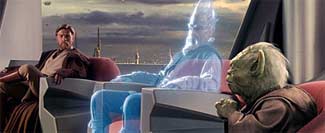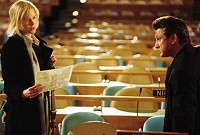|
Star Wars - Episode III - Revenge Of The Sith

Director/Screenwriter: George Lucas
Cast: Ewan McGregor, Hayden Christensen, Natalie Portman, Ian McDiarmid, Samuel L.Jackson, Jimmy Smits, Frank Oz, Anthony
Daniels, Christopher Lee, Kenny Baker, Keisha-Castle Hughes, Silas Carson, Bruce Spence, Temuera Morrison
28 years and 6 films later, George Lucas' grand vision set "a long time ago, in a galaxy far far away"; ends with
"Star Wars: Episode III - Revenge of the Sith". Easily the best instalment of the prequel trilogy, we learn just
how it is that a seemingly decent young man named Anakin Skywalker, can and does become the Sith Lord - Darth Vader. Lucas
lets us see how this transformation takes place with both plausibility and verve in this stunning and at times quite startling
film.
Picking up immediately after the events in Episode II, "Revenge of the Sith"; gives us a real sense of conclusion
to everything we've seen happen in the other 5 films. I had a tangible feeling of a circle being drawn, with the final arc
being added to complete it here. After seeing this, you'll probably want to rush home and watch the original trilogy again,
just to see how Anakin is redeemed after his fall from grace. Essentially the Star Wars saga is really the story of Anakin's
life, from childhood to death, and it is only after seeing "Revenge" that it becomes crystal clear that this was
Lucas' intention all along.
In some regards the Star Wars saga is about all of us, how our imperfections can lead us astray, but also how, no matter
to what depths we may fall, there is always a way for us to climb back up out of the darkness and find the light again. It
is also about power, how it corrupts and how dangerous it really is for any of us to have too much of it. That is the real
seduction of the dark side, and with or without "the force" any one of us can be turned away from the light, because
to walk in that light is much harder than surrendering to our most base desires. It is easier to hate than it is to love,
and we see glaring examples of that every day in our newspapers, on televised news, and on the streets of our cities.
Episode III begins with Anakin (Hayden Christensen) and Obi Wan (Ewan McGregor) attempting a rescue of the kidnapped Chancellor
Palpatine (Ian McDiarmid, in fine form here), taken from Coruscant by a new character, General Grievous - voiced here by Matthew
Wood. Flying in small one-man fighters, the two Jedi fight their way onto the ship were Palpatine is held, and with appropriate
derring-do, manage to spirit the Chancellor away to safety back on the home planet of the Republic. It is after this rescue
that Anakin's fall begins, as Palpatine anoints him a hero and the goodness inside of Anakin begins to be suppressed by the
lure of the quick and easy path offered by the dark side.
Sometimes it is our best intentions that lead us astray, and so it is with Anakin. He begins having nightmares about the
death of his wife, Padme (Natalie Portman), whom he learns is pregnant, and it is his overwhelming desire to ensure her survival
that causes him to seek out powers that are available only through learning about the dark side of the force. Palpatine tells
Anakin a story about a dead Sith Lord who was able to keep death away from people by application of a dark side force power,
and an intrigued Anakin begins to resent his Jedi training, training that places necessary constraints on his abilities.
What finally causes Anakin to fall completely under the spell cast by Palpatine, is that he becomes convinced the Jedi
order wants to take control of the Republic by overthrowing the Chancellor and the Senate. Again, another good intention that
actually helps to turn a good man into a bad one. There is an old adage: "the road to hell is paved with good intentions",
and that saying certainly applies to Anakin and his fate.
George Lucas shows tremendous growth as a writer and as a director with this film, and I believe that the conclusion of
the masterwork of his life will serve as a catharsis for him, enabling him to move forward without some figurative weight
hanging around his neck. I got a very real sense from this film that Lucas is satisfied and happy with what he has accomplished,
and that he feels a tremendous sense of freedom now that the Star Wars films are finally completed. He has finally embraced
his own vision, and he is now free to enjoy his creation fully, and so are we.
Millions

Cast: Alexander Etel, Lewis McGibbon, James Nesbitt, Daisy Donovan
Director: Danny Boyle
Writer: Frank Cottrell Boyce
Running Time: 1 hour 37 min
Danny 'Trainspotting/28 Days Later' Boyle exposes his soft, gooey centre in Millions, a hugely uplifting fantasy caper that
brilliantly substitutes heroin addicts and plagues with huge amounts of heart without sacrificing any of his stunningly original
visual style.
Britain is on the verge of switching to the Euro and Sterling is about to become obsolete. Anticipating the large sums
of money coming through the train stations in order to be changed, a massive heist is executed. Soon after, nine-year-old
capitalist Anthony (Lewis McGibbon) and seven-year-old philanthropist Damian (Alexander Etel, who is utterly fantastic in
this) come across a gym bag, which literally lands in their lap, filled with £229,320 (which Anthony would be quick to tell
you is exactly $533,175).
Deciding not to tell their widower father (a surprisingly English-accented James Nesbitt) about their newly acquired loot,
they realise they need to spend all this cash in a big hurry. Anthony wants to buy property, or failing that, a lot of toys.
But Damian, still coping with their mother's death, thinks God has sent the money for him to give to the poor. His imaginary
friends' visions of various saints throughout history who give him advice (including Claire of Assisi, the joint-smoking patron
saint of television), assure him he's on his way to being blessed. But first he has to make sure a scary robber who's threatening
him can't get the loot.
Frank Cottrell Boyce's (24 Hour Party People) witty script resorts to sentimentality only in appropriately small doses.
Millions is still as quirky and irreverent as Boyle's previous films, and because it's filmed through the eyes of children,
it has an exuberance, humour and intelligence that's totally infectious. It really is a terrific film - and absolutely not
to be missed.
Strings

Directed by: Anders Ronnow-Karland
Cast: (Voices) James McAvoy, Catherine McCormack, Julian Glover, Derek Jacobi, Ian Hart, Claire Skinnner, David Harewood,
Samantha Bond
Strings - a major marionette feature film - is quite an interesting premise and concept. It's slightly odd, unlike early Gerry
Anderson's Thunderbirds/Fireball XL5 etc. in that the puppets are mouth-less, in as much as their lips don't open and close
when they're speaking - but they are surprisingly expressive nonetheless. The film doesn't attempt to pretend that these aren't
puppets, as the strings are integral to who they are and are a key part of the story. Cut a string, and you can maim or kill
someone. Life comes to a baby when its strings are attached. They also act as a visual metaphor for the idea of the interconnectivity
of living beings.
Strings is a classic quest and coming-of-age tale, but it's also surprisingly sussed and clever in the points it makes.
The pointless devastation of war, dispossession of people, bondage and liberation are interesting themes for a film that many
may see as a cute family film - but its also very timely. Strings makes an important point about overcoming unreasoned injustice,
hatred and prejudice. There are, however, some practical difficulties when working with puppets - in the opening scene, the
Emperor writes a letter in the rain, and of course, with strings, you can't have roofs on buildings!
Meanwhile... back to the story. Apparently murdered by the Zeriths, The Emperor of Hebalon lies dead in the torrential
rain - and martial law is declared. The gates of the city are locked, and no outsider can gain entrance. Encouraged by his
uncle, the young Prince and heir to the throne, Hal Tara (NcEvoy), swears to avenge his father's death and, disguising himself
as a slave, sets forth with his squire Erito (Harewood) to seek out the Zerith stronghold. Hal is shocked when, emerging from
the heart of his father's empire, he discovers that Hebalon is not the happy land of his imagination. Years of warfare have
left the country devastated; people cheer to hear of Hal's father's death, and widely regard him as a despot and a tyrant.
As Hal and Erito near the Zerith camp, Hal's fear and hatred grow, a web of treachery surrounds him, and he can no longer
tell friend from foe.
It's an intriguing film - and refreshingly unlike anything you may have seen before. (Oh and do please spare your friends
from commenting 'the acting was wooden' as you leave the cinema - try to resist!!)
Kingdom Of Heaven

Directed by: Ridley Scott
Cast: Orlando Bloom, Eva green, Jeremy Irons, David Thewlis, Brendan Gleeson, Marton Csokas, Liam Neeson
It's 1180 and trouble's brewing in the Middle East (things don't change much over the centuries) as Kingdom Of Heaven opens
with Balian (Orlando Bloom doing a stunning non-singing impression of Bee Gee Barry Gibb), a glowering French blacksmith,
glum due to his wife's suicide following the death of their baby son. At this point who should stride into town than Godfrey
(the ubiquitous Liam Neeson) in search of horseshoes and his long-lost son, who happens to be Balian (how plotline convenient)
and following some initial huffing and puffing posturing, off they trot to the Holy Land in search of honour and glory.
Sadly (no guffaws please from cinemagoers tired of Neeson overload) Godfrey dies en route to Jerusalem, though not before
knighting his wee boy Balian, who then strides into Jerusalem where he is greeted with delight as Godfrey's heir and seemingly
within minutes is dining with the leprous King Baldwin (a brilliantly restrained and steelfacemasked Edward Norton) and bedding
his married sister, the Princess Sibylla (Green), to the irritation of her ambitious husband Guy de Lusignan (Csokas). Still
with me? Let's continue then...
He claims his inheritance, transforms his arid lands into a lush and prosperous farm through an irrigation scheme, and
is generally perceived to be a top geezer. Unfortunately Christian Jerusalem is divided between the King's party, led by Tiberius
(Irons), who have brokered an uneasy peace with Saladin (Ghassan Massoud); and the warmongering Knights Templar under Guy
and his sidekick Reynard (Gleeson, a grotesquely smug and irritating peformance). The Templars know that they only have to
bide their time; the king can't live much longer and then war will be theirs for the taking, with only Balian standing in
their way.
Kingdom of Heaven is Ridley Scott's latest epic adventure and, is, quite frankly - extremely tedious. Unlike the similar
Gladiator which had at its core a simple, human story, a man who just wanted to get back to his wife and son, Kingdom of Heaven
is just a mess of under-characerisation, fast-edits and CGI overload.
In their attempt to be even handed, Scott and screenwriter William Monahan create a blur in the narrative between the
warring factions.The Muslims are presented as tremendously patient and forebearing, only going to war when they are goaded
beyond endurance and their people, including Saladin' own sister, are being murdered. Balian's last stand, in defence of the
ordinary people of Jerusalem, is presented as proto-democratic, which is anachronistic and unconvincing, as is his speech
to the Jews, Muslims and Christians he comes across as some New Labour local councillor with a multicultural brief. Plus Bloom
simply is not in possession of a vociferous theatre-based bombast, vocally he is utterly lacking. The audience needs someone
to root for and a proper victory, instead of which Balian surrenders the city and goes home. It's impossible to care about
this character. He's oddly passive, falling into one situation after another, but handily endowed with all the skills that
he might need; he is in turns a blacksmith, farmer, irrigation expert, surveyor, general, military strategist and politician.
As a medieval blacksmith he'd be lucky if he knew how to read! His perfection and nobility make him, sadly, really dull; he's
not tempted by power, not even for a moment. He just wants to be a good guy.
Bloom's fall may be as quick as his meteoric rise. Luckily he is surrounded by a superb supporting cast, who carry off
the acting honours, but there is a gaping hole where the film's heart should be.
The Interpreter

|

